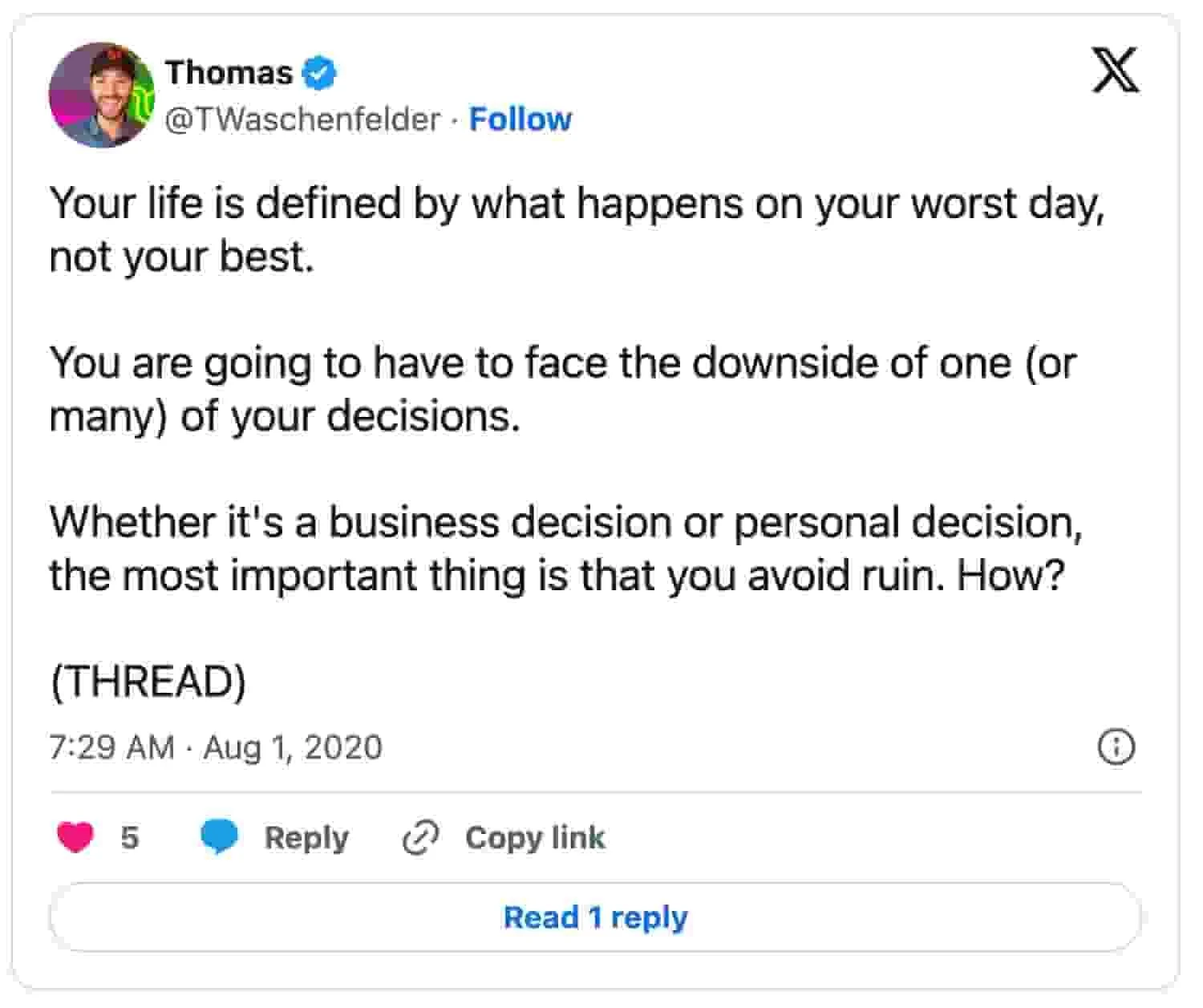Making Good Bets: Positioning, Timing, and Patience
Wealth creation is the process of making good bets over time. These could be what stocks you buy, what creative projects you work on, or what business you start.
But you only have to get rich once. And one good bet can do it.
Three considerations go into making good bets: Positioning, Timing, and Patience.
If there were a fourth, it would be luck. But that’s really a component of all three. With a good bet, you give yourself a chance to get lucky. Let’s see how…
Positioning: Give Yourself More Upside Than Downside.
In any bet, you want to make sure you have more upside than downside. A lot more.
For example, when you buy a stock (you’re long the stock), the most you can lose is your initial investment. If the company goes bankrupt, you won’t lose more than that. The downside is capped.
But the upside to a long position is uncapped. If the business performs well, the stock price can go up and up without hitting any limit. That’s the kind of bet that can make you rich.
The opposite is true of a short position. When you bet on a stock price going down, your upside is capped, while your downside is uncapped. In theory, you can lose an infinite amount of money in a short position if the stock price keeps climbing up when you’ve bet on it going down.
This is the reason why Warren Buffett and his partner, Charlie Munger, hate shorting:
“It's very painful. It's a whole lot easier to make money on the long side. You can't make big money shorting because the risk of big losses means you can't make big bets…It's ruined a lot of people. You can go broke doing it.”
Unlimited Upside Makes You “Antifragile.”
There’s another reason why you want to position yourself with more upside than downside. According to writer and former stock trader, Nassim Nicholas Taleb, it makes you “Antifragile.”
When you’re antifragile, you gain from uncertainty and volatility instead of being hurt by it. You get stronger with chaos.
In Taleb’s book, Antifragile, he gives the example of a package in the mail. If you shake a fragile package, whatever is inside will break. But if you shake a package that is antifragile, the contents inside actually get stronger. It gains from disorder and volatility.
Here’s Taleb explaining this:
“Logically, the exact opposite of a ‘fragile’ parcel would be a package on which one has written ‘please mishandle’ or ‘please handle carelessly.’ Its contents would not just be unbreakable, but would benefit from shocks and a wide array of trauma.”
The same is true for you when you’ve positioned yourself correctly. Here’s Taleb again:
“When someone has more upside than downside in a certain situation, he is antifragile and tends to gain from (a) volatility, (b) randomness, (c) errors, (d) uncertainty, (e) stressors, (f) time.”
With good positioning, volatility helps you, uncertainty is good for you, and surprises are to the upside.
Never Risk Going Broke.
A good bet never puts you into a position where you get totally wiped out if things go wrong. You never want to risk going to “zero.” This includes your health (serious injury or death), your finances (bankruptcy), and your freedom (going to jail).
That’s why it’s so important to watch the downside of any bet. If you can always avoid ruin, the upside usually takes care of itself.
For more info on this, check out my article: The Kelly Criterion: Make Bets In Areas Where You Have An Advantage.
Timing: Make Iterated Bets Over Time.
Most wealth creation stories, at some point, include the phrase, “I was in the right place at the right time.”
And it’s true. A single decision at the right time can change your life. But you have to be open to it! You have to be looking for opportunities all the time and then act with conviction when they come along.
As Charlie Munger says:
“The wise ones bet heavily when the world offers them that opportunity. They bet big when they have the odds. And the rest of the time, they don't. It's just that simple.”
But, it’s not easy to get the timing right on a bet. Much of it is a component of luck.
That’s why Scott Adams, creator of the Dilbert comic strip, suggests you keep trying different things until it happens:
“Timing is often the biggest component of success. And since timing is often hard to get right unless you are psychic, it makes sense to try different things until you get the timing right by luck.”
Making good bets then becomes a process. You try a bunch of things until you get struck by luck.
Become A “Rational flâneur.”
One way to think about this is to become what Taleb calls a rational flâneur. Flâneur is a French noun that means “stroller.”
To become a rational flâneur is to consistently make opportunistic decisions based on changing circumstances.
Here’s Taleb’s full definition, again from Antifragile:
“Rational flâneur (or just flâneur): Someone who, unlike a tourist, makes a decision opportunistically at every step to revise his schedule (or his destination) so he can imbibe things based on new information obtained. In research and entrepreneurship, being a flâneur is called ‘looking for optionality.’ A non-narrative approach to life.”
With this approach, you are looking for a good bet as you “wander.” You have a set destination, but you are always asking if there’s a better way to get there, or indeed, somewhere else you’d rather go.
Just Keep Tinkering.
Tinkering is another way to think about making iterated bets to get lucky with timing.
In business, the faster you can iterate, the faster you can find something that really works. I do this all the time with landing pages, copy for my newsletters, etc.
And it’s an ongoing process. Here’s Taleb writing about this in The Black Swan: The Impact of the Highly Improbably:
“The strategy for the discoverers and entrepreneurs is to rely less on top-down planning and focus on maximum tinkering and recognizing opportunities when they present themselves… The reason free markets work is because they allow people to be lucky, thanks to aggressive trial and error, not by giving rewards or ‘incentives’ for skill. The strategy is, then, to tinker as much as possible and try to collect as many Black Swan opportunities as you can.”
Positive Black Swan opportunities are unpredictable, highly impactful events where the upside of the event is unlimited while the downside is capped (sound familiar?).
If you tinker continually in areas with unlimited upside, at some point, you’ll be the one telling people: “I was in the right place at the right time.”
Patience: Wait For Opportunity And Then Outcome.
Patience comes both at the front end of making a good bet and at the back end.
At the front end, you need the patience to wait for an obvious opportunity.
And on the back end, you need the patience to watch your bet play out over the long term.
Patience With Opportunity.
When you’re looking for an opportunity, you want to wait for what Warren Buffett calls a “fat pitch.” This is a big opportunity that’s entirely within your circle of competence that you know you have a good chance of hitting out of the park.
You’re waiting for something you understand really well that gives you an edge. And it should be so obvious, you’d be stupid not to pursue it.
Here’s Munger on his track record with Buffett:
“If you took our top fifteen decisions out, we'd have a pretty average record. It wasn't hyperactivity, but a hell of a lot of patience. You stuck to your principles and when opportunities came along, you pounced on them with vigor.”
Waiting is the hardest part. You need discipline and patience to wait for an obvious opportunity. Most people can’t do it, so they go after mediocre ones. Don’t.
You want to wait for something so obviously for you, with uncapped upside and capped downside, and then swing for the fences.
Patience With Outcomes.
One of my favorite quotes comes from Charlie Munger: “The big money is not in the buying and selling, but in the waiting.”
When you see a good opportunity, you must “pounce of them with vigor,” as Charlie says.
But, you must also be incredibly patient to see the results of your actions. Anything worth building takes time. And any good bet takes time to play out.
Learn to think in decades, not months. And never let your emotions take over as you wait:
“You need to keep raw irrational emotion under control. You need patience and discipline and an ability to take losses and adversity without going crazy. You need an ability to not be driven crazy by extreme success.” - Charlie Munger
Stay patient. With enough good bets over time, you’ll be just fine.
Thanks for reading.
If You Want More Ideas Like This, Follow Me On Twitter And Subscribe To My Newsletter:
SOURCES
Adams, Scott. How to Fail at Almost Everything and Still Win Big: Kind of the Story of My Life. Portfolio/Penguin, 2014.
Taleb, Nassim Nicholas. Antifragile (Incerto) . Random House Publishing Group. Kindle Edition.
Taleb, Nassim Nicholas. The Black Swan: Second Edition: The Impact of the Highly Improbable (Incerto) . Random House Publishing Group. Kindle Edition.
Warren Buffett's quote can be found here.








